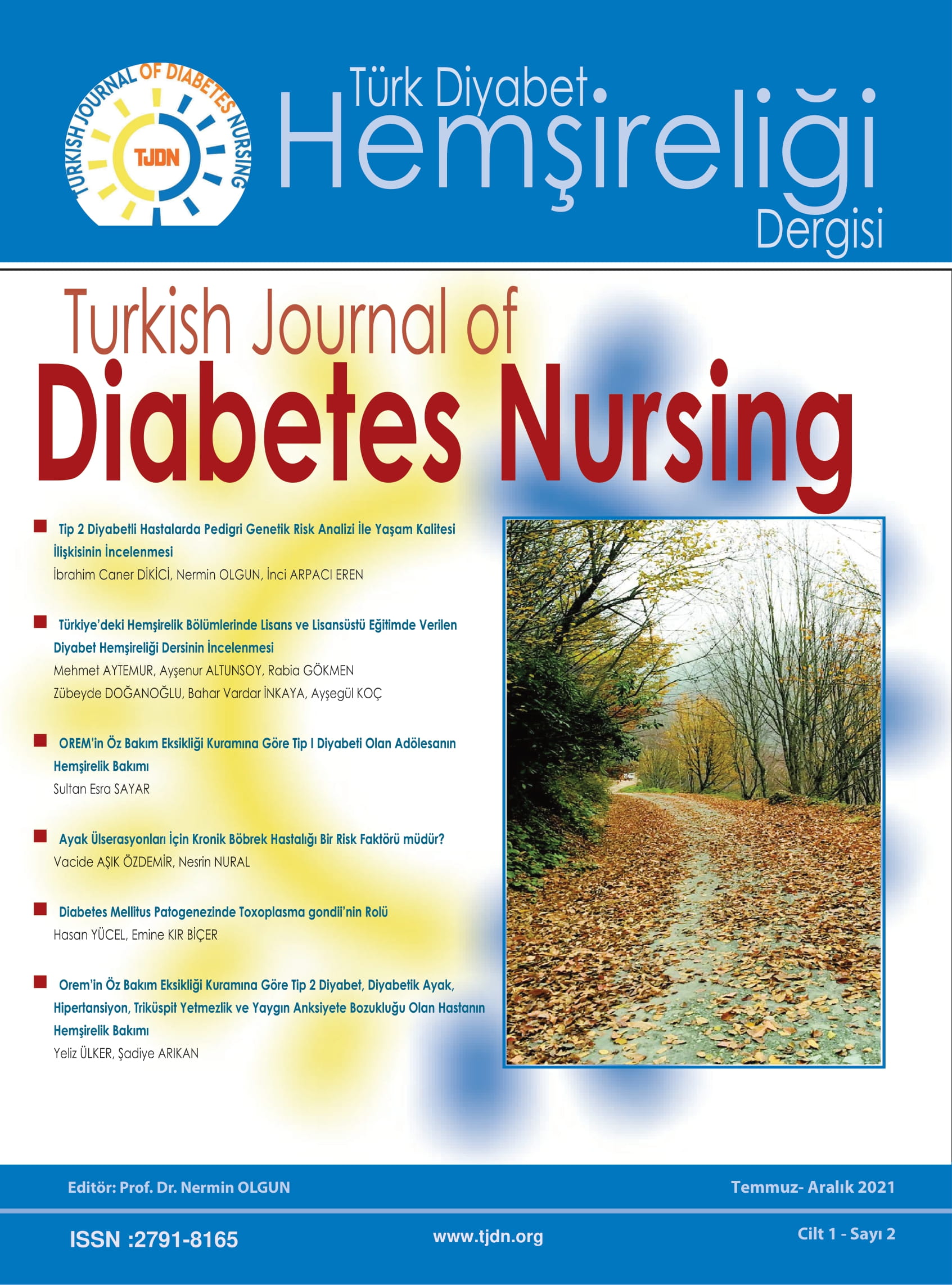Author :
Abstract
Toxoplasma gondii (T. gondii), dünya çapında önemli bir hastalığın etken parazitidir. Bu zorunlu hücre içi parazit, pankreas dahil olmak üzere herhangi bir çekirdekli hücreyi enfekte edebilir ve çoğalabilir. İnsülin, pankreas tarafından salgılanan ve kan şekeri konsantrasyonunu kontrol etmekten sorumlu bir hormondur. İnsülin üretiminin eksikliği, diabetes mellitus gelişiminde rol oynamaktadır. Diyabetes mellitus dünya çapında bir halk sağlığı sorunu olmaya devam etmektedir. Artan salgını açıklamak için obezite, fiziksel hareketsizlik ve diyet kalıpları gibi potansiyel nedenler öne sürülse de, tanımlanamayan çevresel belirleyiciler de olabilir. Yeni gelişen bu araştırma alanı bulaşıcı ve çevresel patojenlerin diyabetle ilişkisini incelemeye başlamaktadır. Özellikle bu patojenler düşük dereceli inflamasyona neden olarak tip 2 diyabet (T2DM) riskini ve gelişimini kolaylaştırır. Ancak bu teori üzerine yapılan çalışmalar halen yetersizdir. Bu derleme, T2DM'ye yol açan inflamasyon sürecinde T. gondii'nin rolüne ilişkin mevcut bilgileri ele almakta, T. gondii ve T2DM arasındaki ilişkiyi açıklayan mevcut çalışmaları incelemekte ve gelecekteki çalışmalar için T. gondii'nin T2DM üzerindeki rolünü belirlemek için önerilerde bulunmaktadır.
Keywords
Abstract
Toxoplasma gondii (T. gondii) is the causative parasite of an important worldwide disease. This obligate intracellular parasite can infect and replicate inside any nucleated cells including those of pancreas. Insulin is a hormone secreted by the pancreas and is responsible for controlling blood glucose concentration. Deficiency of insulin production accounts for the occurrence of diabetes mellitus. Diabetes mellitus continues to be a major challenge for public health authorities worldwide. While potential causes such as obesity, physical inactivity, and dietary patterns have been proposed to explain the growing epidemic, there may also be unidentified environmental determinants. However, the studies on this theory are still insufficient. This review addresses the existing knowledge of the role of T. gondii in the inflammation process leading to T2DM, examines the current studies describing the relationship between T. gondii and T2DM, and makes recommendations for future studies to determine the role of T. gondii in the pathogenesis of T2DM.
Keywords
- 1. American Diabetes Association. (2020). Introduction: Standards of Medical Care in Diabetes-2020. Diabetes Care, 43(Suppl 1), S1-S2. doi:10.2337/dc20Sint. PMID: 31862741. http://www.ncbi.nlm.nih.gov/pubmed/31862741 (Erişim Tarihi: 01.06.2021)
- 2. International Diabetes Federation. (2021). Diabetes Atlas. 10th edition, htt- ps://diabetesatlas.org/atlas/tenth-edition/ (Erişim tarihi: 21.11.2021)
- 3. Gokce, C., Yazar, S., Bayram, F., Gundogan, K., Yaman, O., & Sahin, I. (2008). Anti-Toxoplasma gondii antibodies in type 2 diabetes. The National Medical Journal of India, 21(1), 51.
- 4. Türkiye Endokrinoloji ve Metabolizma Derneği (TEMD). Diabetes Mellitus ve Komplikasyonlarının Tanı, Tedavi ve İzlem Kılavuzu 2020. Ankara: TEMD Yayınları.
- 5. İmamoğlu, Ş., Satman, İ., Akalın, S., Salman, S., & Yılmaz, C. (2015). Geçmişten Gelecege Diabetes Mellitus: Ankara, Pelin Ofset Matbaacılık.
- 6. Jafari Modrek, M., Saravani, R., Mousavi, M., Salimi Khorashad, A., & Piri, M. (2015). Investigation of IgG and IgM antibodies against Toxoplasma gondii among diabetic patients. International Journal of Infection, 2(3).
- 7. Karakullukçu, S. (2021). Trabzon’da 20 Yaş ve Üzeri Bireylerde Toksoplazmoz Seroprevalansı. Mikrobiyol Bul, 55(2), 233-247.
- 8. Khattab, H. M., El Bassiouni, S. O., Abuelela, M. H., & Abd Elsalam, D. O. (2019). Seroprevalence of Toxoplasma gondii among a group of Egyptian patients with type I diabetes mellitus. Bulletin of the National Research Centre, 43(1), 1-7.
- 9. Li, Y.-X., Xin, H., Zhang, X.-Y., Wei, C.-Y., Duan, Y.-H., Wang, H.-F., & Niu, H.-T. (2018). Toxoplasma gondii infection in diabetes mellitus patients in China: seroprevalence, risk factors, and case-control studies. BioMed research international, 2018.
- 10. Majidiani, H., Dalvand, S., Daryani, A., Galvan-Ramirez, M. d. l. L., & Forou- tan-Rad, M. (2016). Is chronic toxoplasmosis a risk factor for diabetes mellitus? A systematic review and meta-analysis of case-control studies. Brazilian Journal of Infectious Diseases, 20, 605-609.
- 11. Mehtap, A., Ozcelik, S., & Ozpinar, N. (2018). Seroprevalence of Toxoplasma gondii in patients receiving cancer treatment. Cumhuriyet Medical Journal, 40(1), 19-24.
- 12. Nosaka, K., Hunter, M., & Wang, W. (2016). The role of Toxoplasma gondii as a possible inflammatory agent in the pathogenesis of type 2 diabetes mellitus in humans. Family Medicine and Community Health, 4(4), 44-62.
- 13. Ozcelik, S., Alim, M., & Ozpinar, N. (2020). Detection of Toxoplasma gondii in- fection among diabetic patients in Turkey. Clinical Epidemiology and Global Health, 8(3), 899-902.
- 14. Özpınar, N., Özçelik, S., Yılmaz, N., Yelboğa, Z., & Kaya, T. (2020). Seropreva- lence of Toxoplasma gondii infection among psychiatric diseases. International refereed academic journal of sports, health and medical sciences, cilt.34, no.478117, ss.52-60.
- 15. Saki, J., Shafieenia, S., & Foroutan-Rad, M. (2016). Seroprevalence of toxoplas- mosis in diabetic pregnant women in southwestern of Iran. Journal of Parasitic Diseases, 40(4), 1586-1589.
- 16. Satman, I., Omer, B., Tutuncu, Y., Kalaca, S., Gedik, S., Dinccag, N., . . . Canbaz, B. (2013). Twelve-year trends in the prevalence and risk factors of diabetes and prediabetes in Turkish adults. European Journal of Epidemiology, 28(2), 169-180.
- 17. Shih, Y.-L., Ho, K.-T., Tsao, C.-H., Chang, Y.-H., Shiau, M.-Y., Huang, C.-N., & Yang, S.-C. (2013). Role of cyotkines in metabolism and type 2 diabetes mellitus. Int J Biomed Lab Sci, 2(1), 1-6.
- 18. Shin, D.-W., Cha, D.-Y., Hua, Q. J., Cha, G.-H., & Lee, Y.-H. (2009). Seroprevalence of Toxoplasma gondii infection and characteristics of seropositive patients in general hospitals in Daejeon, Korea. The Korean Journal of Parasitology, 47(2), 125.
- 19. Siyadatpanah, A., Tabatabaie, F., Oormazdi, H., Meamar, A., Razmjou, E., Hadi- ghi, R., & Akhlaghi, L. (2013). Comparison of anti-Toxoplasma IgG and IgM antibodies determined by ELISA method in diabetic and non-diabetic individuals in west Mazandaran province, Iran, 2011-2012. Ann Biol Res, 4(6), 281-285.





